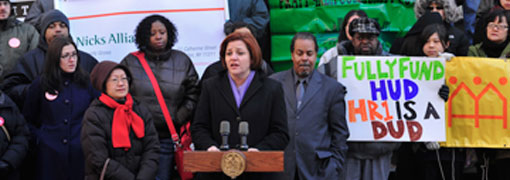
New York City Council members advocating for greater HUD funding, led by then-Speaker Christine Quinn, who now leads Win.
At a time of unprecedented need in New York, the Supportive Housing Network of New York appreciates that Congress wisely chose to increase vital funding for key HUD programs that work to address the multifaceted causes of homelessness. A strategy to end homelessness must include increasing the amount of supportive housing for people who are chronically homeless, expanding the amount of affordable housing, and preserving our nation’s existing portfolio of affordable housing. To do this, Congress must build on the progress made in the 2018 budget. It also must make necessary improvements while rejecting harmful proposals designed to undermine these programs.
Download our federal policy priorities here.
Budget Priorities:
McKinney-Vento Homeless Assistance Grants: Widely regarded as HUD’s most effective program, McKinney-Vento is slated for small increases this year that will barely cover rising rents. Virtually all McKinney-Vento funding pays to rent or lease permanent supportive housing for disabled, formerly homeless people, and to cover a portion of the services that they need to remain stably housed. In 2017, there were almost 90,000 homeless people at any given time in NYS. The program needs to be funded at $2.8 billion.
Housing Choice Vouchers: This essential rental assistance program includes funding for the highly successful Veterans Affairs Supportive Housing program, which has helped reduce chronic veteran homelessness by 75%. The Network calls for an additional allocation of vouchers for Veterans, the disabled and to reunite families. The program needs to be funded at $23.1 billion.
HOME Investment Partnership: HOME funding in NYS is a vital component in creating housing for the lowest-income New Yorkers. Each HOME dollar leverages an additional $4 in private and state funding toward the creation of housing for at-risk individuals and families. This program must be funded at $1.4 billion, a modest increase over FY 2018.
Project Based Rental Assistance. The Network appreciates that the House and Senate funding levels appear to be adequate to fund all existing units.
HUD 202 and HOPWA: The Network supports increased funding for senior housing (HUD 202) at $678 million. Additionally, we support the National AIDS Housing Coalition ask of $393 million for housing for persons living with HIV/AIDS (HOPWA). The Network appreciates that the House funding level appears to be adequate to fund all existing units but is concerned about the Senate’s proposed funding level for HOPWA.
Policy Priorities:
Pass legislation to improve Low Income Housing Tax Credits: Both the Cantwell-Hatch Affordable Housing Credit Improvement Act of 2017 (S. 548) and its companion, the Curbelo-Neal Affordable Housing Credit Improvement Act of 2017 (H.R. 1661) make major improvements to LIHTC. The Network is pleased that portions of these bills were included in the Omnibus spending bill for FY 2018, including a four-year 12.5% increase in available credits and income averaging. Still needed are other provisions, including setting a minimum 4% rate and allowing disabled people to live in tax credit properties while pursuing their educational goals.
Protect the National Housing Trust Fund: The first new housing program in a generation, NHTF specifically focuses on building housing for extremely low income renters (0-30% AMI). Initial funding began to flow to the states in 2016, with New York receiving $7 million. This has grown to $21 million as of this year. A small percentage of Fannie Mae and Freddie Mac business funds this program as a dedicated source, outside of the budget appropriations process. Increasing the percentage of new business that these Government Sponsored Enterprises (GSEs) contribute, and adding infrastructure funding for housing, are two recommended ways to grow this program.
Reauthorize and Fund the US Interagency Council on Homelessness: President George W. Bush created the USICH to comprehensively address homelessness by bringing together 19 federal agencies to collaborate. We support the Collins-Reed bill (S743) that removes the sunsetting of the Council on Oct. 1, 2020. The USICH was instrumental in creating Opening Doors, the Federal Response to Homelessness. The Council also provides a wealth of information on best practices for local homeless interventions. The Council requires a $3.6 million annual appropriation.
End the harmful proposals to impose time limits, work requirements, and high tenant rents on Section 8 and public housing programs : The Administration and Congressman Ross from Florida have proposed plans to raise rents on HUD tenants, including poor, elderly, and disabled people, all of whom are least able to afford these increases. In one example, a working mother would lose her child care credit and therefore see her rent spike by 89%.

